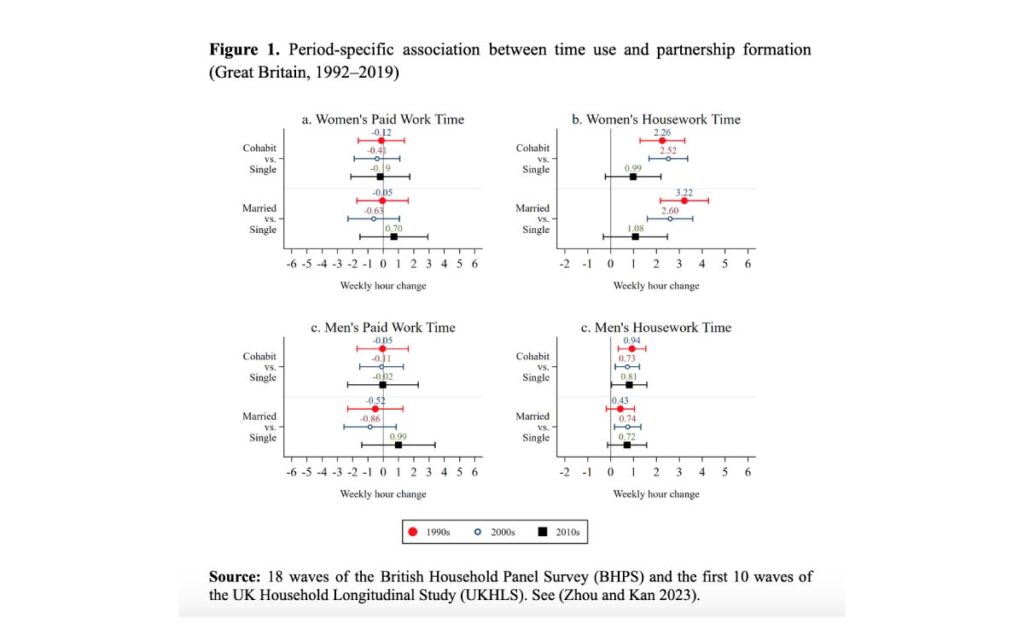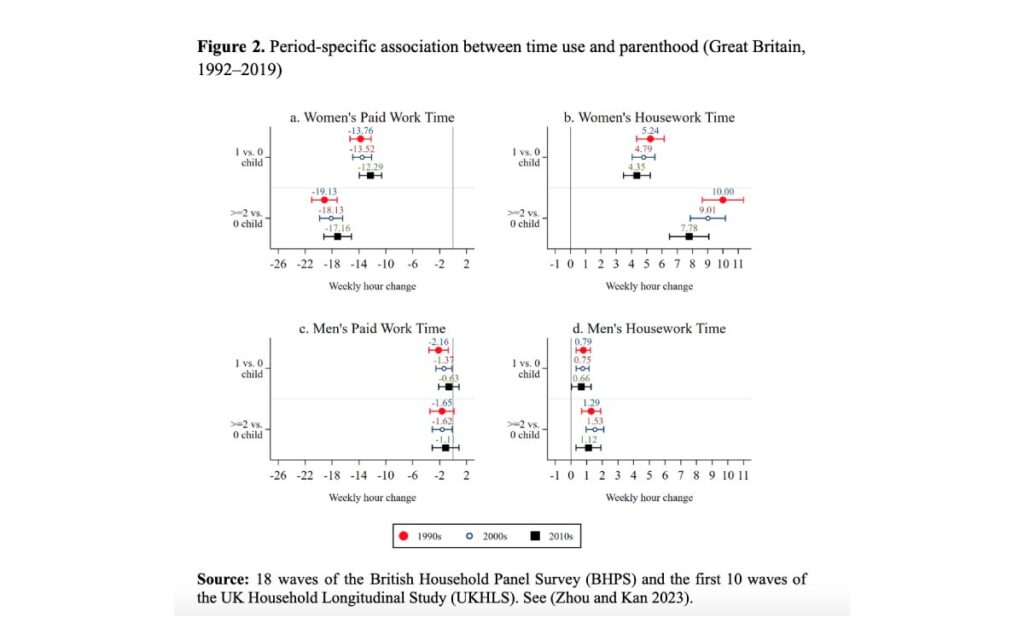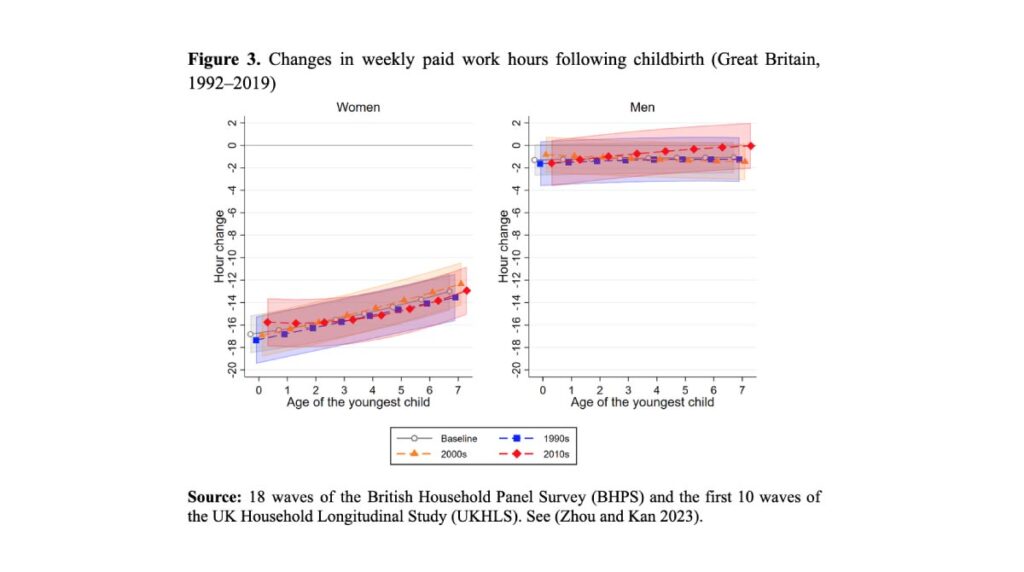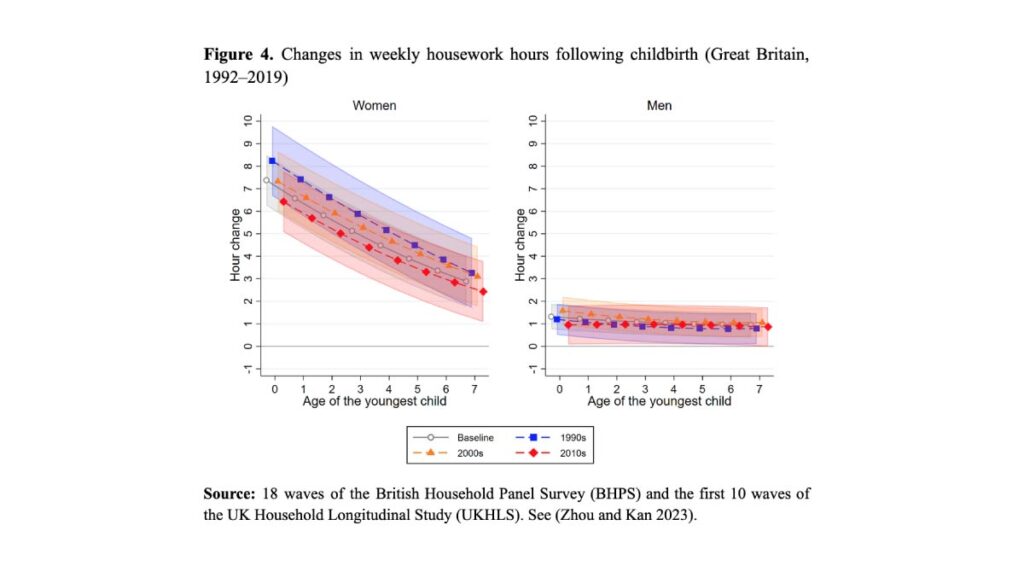More and more mothers with young children stay in the labor market today. In the United Kingdom, the share has risen from 62% in 1989 to 72% in 2023. However, when women become mothers, their hours of paid work decrease substantially, in contrast to new fathers, whose change in paid work time is modest. Muzhi Zhou and Man-Yee Kan discuss whether the gendered impact of parenthood on time use will weaken as family policies pay more attention to gender equality.
Almost everywhere around the world, women spend two to three times more time on housework than men. This disproportionate division of domestic responsibilities between genders has been identified as a key reason for the gender pay gap and the reduction in women’s paid work time when they become parents. The expectation that women will take on the majority of household chores and caregiving responsibilities has created a barrier to their participation in the labor market and their ability to advance in their careers. This reinforces traditional gender roles and perpetuates gender inequality in both the workplace and the home. An increasing number of countries are adopting social policies to promote gender equality, designed to address the specific needs and challenges faced by women and men in different areas of life, such as education, employment, and family life.
Reasons for a change
Family policies in Great Britian used to reinforce a gendered division of labor, with expensive and inadequate childcare being the prevalent reason, but things are gradually changing. Currently, a maximum of 52 weeks of maternity leave is available, of which a maximum of 39 weeks is paid. New fathers have only up to two weeks of paid paternity leave, available since 2003. Since 2010, some measures have been introduced to promote gender equality in the domestic division of labor, such as increased free childcare provision and, since 2015, shared parental leave (SPL), which allows parents to share up to 50 weeks of leave and up to 37 weeks of pay between them after the birth or adoption of a child. SPL is designed to give parents more flexibility in how they take time off work to care for their child, and to encourage more fathers to take an active role in parenting.
The annual free childcare provision was increased from 412 hours in 1998 to 570 hours in 2010. It has now been extended to all parents of three- and four-year-olds in England and those of two-year-olds from disadvantaged backgrounds. Meanwhile, gender equality in the UK’s labor market has made progress since the early 1990s, with a rise in women’s employment rates and a decrease in the gender pay gap: women’s employment rates rose from 62% in 1989 to 72% in 2023, with the largest increase for women with dependent children. The corresponding rate was 78% for men in 2023. The gender pay gap decreased from 27.5% in 1997 to 14.3% in 2023. Additionally, the proportion of women in senior management positions increased from 19% in 2012 to 34% in 2020.
Reasons for stagnation
The cost of childcare services remains a significant barrier to women’s participation in the labor market; the average cost of 25 hours of childcare per week for a child under two was £127 in 2021. In addition, men’s contribution to housework and childcare is barely increasing. From 2000 to 2014, the childcare time reported by fathers remained stable at one hour during weekdays and one and a half hours during weekends (Henz 2019). While some measures have been introduced to promote gender equality in the domestic division of labor, such as increased free childcare provision and shared parental leave, the uptake of shared parental leave has been low, with only 2% of eligible parents taking advantage of the policy. As societies strive to create more family-friendly policies, the impact of family formation on people’s lives has become a topic of interest. Are women and men experiencing more similar shifts in time allocation when they get married and have children? Are these policies creating a more equitable distribution of work and family responsibilities?
The changed and unchanged impact of family formation on time use
In a recent study (Zhou and Kan 2023) we shed light on these questions, exploring the impact of partnership and parenthood on the gender division of labor in Great Britain over the past 30 years. We found that prior to the 2010s, women’s housework time increased by approximately 2.5 hours, while that of men increased by about 0.8 hours when they were in partnerships. However, after the 2010s, both women and men increased their housework time by the same amount of approximately 1 hour when in a partnership (Figure 1).

Regarding parenthood, we found that women reduced their paid work time by between 12.3 and 13.8 hours, approximately, when they had their first child, while men’s paid work time decreased by between 0.63 and 2.16 hours when they became fathers (Figure 2 and Figure 3). In other words, the substantial gendered impact of parenthood on paid work has remained relatively unchanged over the past 30 years.


It is noteworthy that the increase in women’s housework time after having a child has decreased over the last 30 years: in the 1990s, it increased by 5.2 hours, in the 2000s by 4.8 hours, and in the 2010s by 4.3 hours. However, the increase in men’s housework when they become fathers has remained stable at approximately 0.75 hours (Figure 2 and Figure 4).

Conclusions
Our findings suggest that while the traditional gender roles associated with partnership formation have weakened over time, motherhood still reduces women’s paid work time in Great Britain to a similar extent as it did 30 years ago.
These findings highlight the persistence of traditional gender roles and the need for policies that promote a more equitable distribution of work and family responsibilities. In other words, the gender revolution in the division of labor among parents has stalled in Great Britain, and family policies have not been successful in increasing mothers’ paid work time and fathers’ unpaid work time.
References
Henz, Ursula. 2019. “Fathers’ involvement with their children in the United Kingdom: Recent trends and class differences.” Demographic Research 40 (30):865-896.
Zhou, Muzhi, and Man-Yee Kan. 2023. “The Gendered Impacts of Partnership and Parenthood on Paid Work and Unpaid Work Time in Great Britain, 1992–2019.” Population and Development Review 49 (4):829-857. doi: https://doi.org/10.1111/padr.12593


